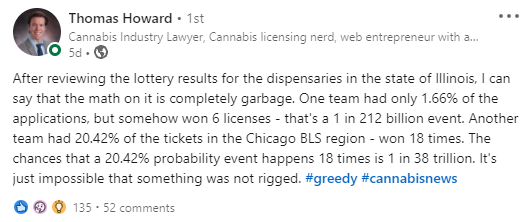The German national election is over, and the results are in. The Cliff’s Notes version of the same is that there has been an upset in the German electoral map in a way that is still reverberating in political circles as coalition talks about which parties will form the new government get underway.
There are a few issues that most of those parties, which saw the greatest gains this time around all agree on. And the good news for the industry, patients and those who want a recreational market is that this inevitably spells more cannabis reform.
It is for precisely this reason that the German cannabis question is currently all abuzz in the industry domestically because everyone knows that the status quo will not stand. The medical industry has been hamstrung by quality and production issues. Beyond this, there are numerous burdensome insurance requirements and the general refusal of doctors to engage with the same—just on a financial level—let alone matters of efficacy.
Then, of course, there is the famed German common sense that has begun to filter through the debate, starting with the fact that there have been a few too many high-profile flubs of late—including one of the largest German grocery chains (and one of the top grocery retailers in the world) being raided in August, by the police. All developments are signs that the status quo will not stand much longer.
There is already a lawsuit now pending, and from the business community, about the classification of CBD—and the need to remove it from the German Narcotics Act to bring this into line with the decision on a European level last year that this cannabinoid is not a narcotic.
However at this juncture, change beyond just CBD is also clearly on the cards.
According to Christian Lindner, the FDP’s power broker, known for his election slogan of wie est ist, darf es nicht bleiben (things cannot stay the way they are), the legalization of cannabis is the issue that will bring the new ruling coalition together.
What is Likely to Happen in the German Market
While any speculation about who will make up the ruling coalition, much less specific policies likely to come of the same at this point is just that, there are a few trends, if not statements, that are likely to drive a coalition of several parties on broad issues.
Given this as well as suitably vague comments from those doing the brokering, it is also likely that the SPD, which won just under 26 percent of the vote, will partner in a coalition government with both the FDP (economic liberal party) which also gained significantly in the elections (11.5 percent) and the Greens (14.8 percent).
Regardless of what happens specifically, all parties with the exception of the extreme right wing Alternativ für Deutschland or AfD (which lost votes nationally this time) have a much more progressive outlook about cannabis than the CDU. This means, generally, it is also safe to assume at minimum that decriminalization is on the agenda for sure within the next several years, and potentially recreational cannabis trials too (see Switzerland if not Luxembourg not to mention developments in Portugal and Holland at minimum).
The second discussion is going to be a much harder fought battle at least politically, but it is also clear that it cannot be avoided completely anymore.
Things Cannot Stay the Same
This election is, absolutely, one of the most momentous in Germany, if not Europe, since the end of WWII. That is how long the CDU has been the ruling party here—and its defeat, even if by a whisker, as well as patterns of defections of voters to other parties tells its own story to those with an interest in German if not European politics more generally.
When it comes to cannabis specifically, it is clear that Germans generally, are fed up with the ridiculous nature of the mish mash of cannabis regulations that currently cause problems for everyone. Even GMP distributors have been raided. For the burgeoning CBD specialty market, a visit from the fuzz is almost a rite of passage. On the patient side of the conversation, jail terms for patients is not a conversation that wins points with many in the political class.
Beyond this, it is also clear that Europe, if not the EU, is moving slowly to a more serious conversation about cannabis reform and of a kind that is a bit more momentous than just decrim.
The Swiss recreational trial is going to have an impact on the willingness of the German industry to push some kind of reform forward that might, depending on how active the advocacy and business community is, result in some kind of recreational trial in the nation’s largest cities.
Germany is also no longer in a cannabis vacuum in Europe (not that it ever really was). Just across another border, Holland is getting a national market going within Europe. And no matter what the news coming out of Luxembourg of late (namely that they may delay their recreational trial because of a potential influx of cannatourists from neighbouring countries including Germany), this is not going to be delayed forever.
While it is not likely that Luxembourg will delay their market until Germany moves on a recreational trial, what is entirely possible is that a softening of cannabis policy here will also allow other European countries to move forward with other kinds of change now clearly in the cards.
Beyond these developments as well as what is currently afoot in Switzerland, the news that the Czech Republic is reconsidering its discussion with cannabis (including allowing up to one percent THC in its hemp crops) has basically created a situation where the Germans are literally surrounded if not outnumbered by Europeans now agreeing to treat cannabis with low or no THC like any other plant, and cannabis with higher levels more like alcohol than a narcotic drug.
The conversation just within the DACH trade alliance (Switzerland, Austria, and Germany) is also likely to be an interesting one.
Regardless, given the current untenable market conditions for most, the huge costs of a solely pharmaceutically inclined cultivation, production and distribution market, pent-up forces which have continued to push for reform, will be able to move the needle forward more than incrementally over the next few years.
How far, exactly, however, this is likely to go and how quickly is another question altogether.
Regardless, change is clearly in the offing—and further as a political issue with little negative impact and a whole lot of upside—namely creating a big “issue” that the majority of parties now likely to drive the political agenda can agree on.
One thing is for certain. Further reform of a federal kind in the U.S. will absolutely impact the conversation. And in the meantime, the European states are lining up to begin experimenting with full reform in a way that is starting to look very familiar to Americans with experience in both markets.
The national change of power in Deutschland is only going to support such moves in this direction—both nationally and across the region.
The post How Will the German Elections Impact the Recreational Cannabis Market? appeared first on High Times.
from News – High Times https://ift.tt/3on2XNU
via
IFTTT


